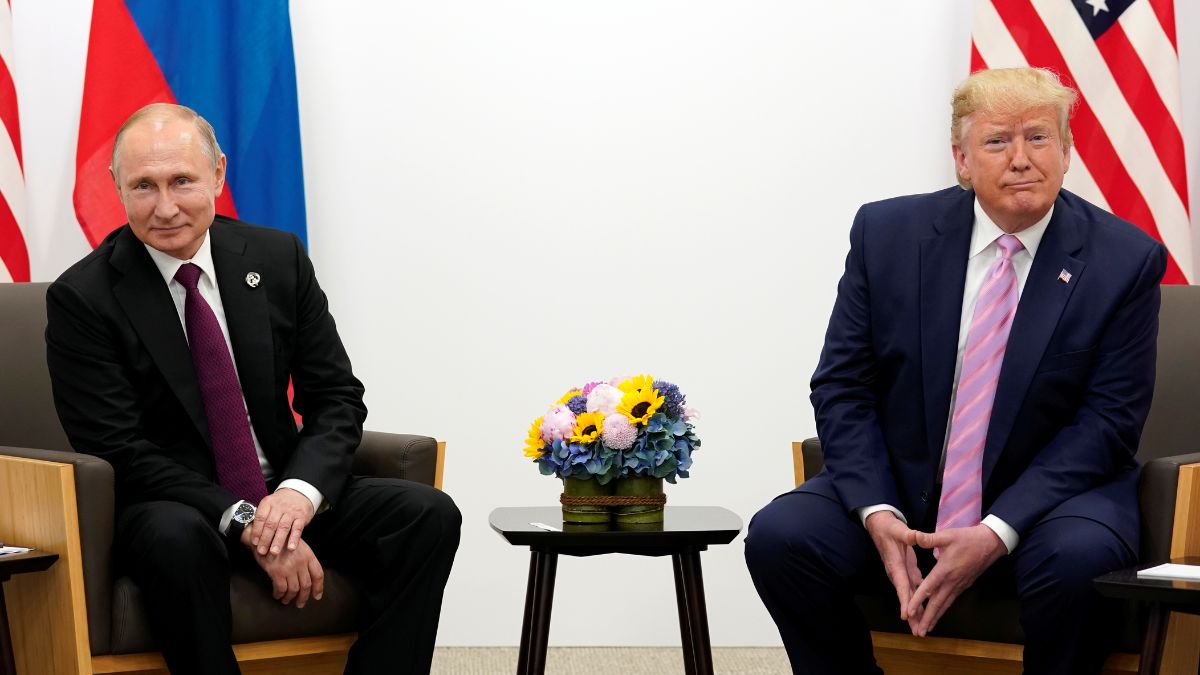Trump's Ultimatum to Putin: Negotiate or Face Severe Sanctions
Former US President Donald Trump issued a stark warning to Russian President Vladimir Putin: come to the negotiating table regarding the Ukraine conflict, or face crippling sanctions and trade tariffs. In a series of posts on his social media platform, Truth Social, Trump laid out his proposed solution, suggesting a two-pronged approach. He painted a stark picture, implying that the longer Putin delays, the worse it will get for Russia. Are we witnessing a high-stakes game of political brinkmanship? Let's dive in!
Trump's Tough Stance: Sanctions and Negotiation
Trump's message was clear: Russia needs to halt its military actions in Ukraine and engage in diplomatic talks. Failure to do so, he stated unequivocally, would result in the imposition of severe economic penalties. He outlined the potential imposition of high levels of "Taxes, Tariffs, and Sanctions" on any Russian goods entering the US or other participating countries. This is not simply a verbal warning; it's a threat carrying significant potential repercussions for the Russian economy. It appears to be a direct response to the prolonged conflict, demonstrating a hardline approach compared to previous strategies employed by his administration and subsequent ones. What does this say about the geopolitical landscape going forward?
The Economic Weapons
The sanctions mentioned by Trump are no mere idle threat. They hold considerable weight given their potential impact on Russia’s export-driven economy, particularly regarding oil and gas sales to the international community, creating substantial leverage. Targeting Russia's oil exports will be a significant hit to the national treasury. Furthermore, the effect on related industries throughout the entire chain would be catastrophic for a struggling Russian economy. The implications of such financial warfare extend beyond Russia, too, affecting world markets in far-reaching ways.
Trump's Offer: A Chance for Peace?
Despite the threat of significant sanctions, Trump offered an olive branch. He emphasized that he seeks not to harm Russia, expressing a fondness for the Russian people and suggesting a strong past working relationship with Putin. Notably, he recalled the significant sacrifices made by the Soviet Union in WWII, drawing upon this historical connection. The intent of highlighting this aspect could signal an attempt to appeal directly to the emotional side of the argument. He stated that he aims to "do Russia a very big favor" by offering a pathway to end the war.
A Different Approach: Diplomacy over Force
Trump contrasted his approach to current policy by emphasizing that only a "competent president" could have avoided this conflict. He asserted his ability to deal effectively with Putin and claimed that if he had been president, the invasion of Ukraine would never have happened. This statement is in direct opposition to the currently ongoing discussions about NATO strategies. This provocative comparison underscores a stark difference of opinion compared to the status quo and directly challenges current geopolitical approaches. Would a stronger hand with Putin have created a different outcome?
Past Relationships: A Point of Leverage
Trump highlighted his previously cordial relationship with Putin, suggesting that it might serve as the key to resolving this dispute. He asserted Putin's respect and how it contrasted to current relationships. This highlights a strategic claim: personal relationships with world leaders, potentially cultivated over a long period of time, provide opportunities to navigate complicated conflicts peacefully. Many see these relationships and claims as bold strategies. Was Trump's understanding with Putin sufficient enough to be utilized as a bargaining chip during ongoing negotiations?
The Road Ahead: Uncertainties and Risks
Trump's statements reveal a nuanced perspective that considers both conflict and diplomacy. While his strong position makes his threats appear legitimate, this bold stance holds both promise and danger. This method of approaching global relationships provides food for thought regarding the potential effects of implementing similar techniques throughout various world negotiations. The long-term ramifications of both paths are significant: military escalation and international relations require meticulous calculation. Whether his unique negotiating style might lead to a peaceful resolution, or intensify this conflict, only time will tell.
Trump's Proposals
Trump's plans suggest several key points that require further discussion. For instance, his request that the EU should pay a greater amount financially regarding Ukraine and questioning the reasoning behind US subsidies highlights several key concerns among many of his supporters. As more information is released regarding these issues, several questions regarding these statements remain unresolved. While his words seem bold, many continue to view them skeptically, despite his experience in high-stakes negotiations. Could his method of diplomacy result in positive change? Or will his rhetoric only serve to amplify tensions?
The Urgency
Trump emphasizes the urgent need to find a peaceful solution and brings up the staggering number of civilian casualties. His remarks underline a fundamental point in foreign policy: every negotiation contains risks and rewards. While discussions regarding foreign relations remain, how will we determine the success of such risky political strategies?
Take Away Points:
- Trump's proposed solution highlights the complexities of international relations.
- Sanctions against Russia could drastically affect world markets.
- Trump's claim of better past relations with Putin highlights several unresolved points.
- The urgency and need for a solution is undeniably significant.
- Assessing the long-term effects of Trump's methods remains uncertain.




